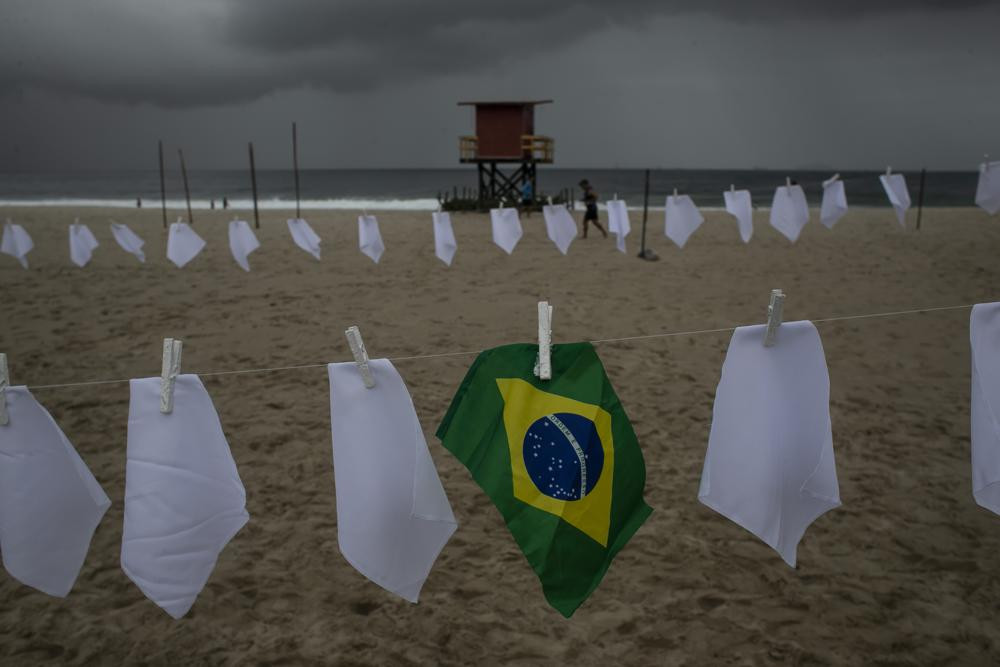Bars in Sao Paulo are full again for evening happy hours, lawmakers in the capital of Brasilia have nearly done away with video sessions via Zoom, and Rio de Janeiro’s beaches are packed. Calls for strict social distancing seem but a memory.
Brazil appears intent on returning to pre-pandemic normalcy, even as its death toll tops 600,000, according to official data on Friday from the health ministry. Relief in both COVID-19 cases and deaths have been particularly welcome given experts’ warnings that the delta variant would produce another wave of destruction in the country with the second-most victims. So far, that hasn’t materialized.
The country’s average daily death toll has hovered around 500 for a month, down sharply from more than 3,000 in April. Almost 45% of the population is fully vaccinated, and a booster shot is being administered to the elderly. A greater percentage of Brazilians are at least partially vaccinated compared to Americans or Germans, according to Our World in Data, an online research site.
Improvement has encouraged mayors and governors to admit fans into soccer matches, and let bars and restaurants stay open until the wee hours. Some are even contemplating the end of mask mandates, which people often ignore already.
Marcelo Queiroga, Brazil’s fourth health minister since the pandemic hit, suggested in a press conference on Friday that masks should not be mandatory. “Why would I pass a law to force people to use condoms? Don’t even think of it,” he said.
Rio’s mayor has announced plans to bring back the city’s massive New Year’s Eve party on Copacabana beach.
Gonzalo Vecina, a professor of public health at the University of Sao Paulo, told The Associated Press in July that delta, which is more contagious, would cause “a new explosion” of cases within weeks. He was hardly alone among experts sounding the alarm.
Now, Vecina believes the high number of Brazilians infected earlier this year with the gamma variant -- first identified in the Amazonian city Manaus -- may have slowed delta’s advance.
“That isn’t a conclusion from a study; it is a possibility we are raising in the face of what we are seeing,” Vecina said. “We are seeing delta rise in countries that reopened just as much as Brazil, and our number of cases is still going down, with few very particular exceptions.”
Some analysts remain worried about delta’s potential to spread. Among them is Miguel Lago, executive director of Brazil’s Institute for Health Policy Studies, which advises public health officials. He believes authorities are taking considerable risk by reopening too much and announcing celebrations, and that Brazil may soon see more hospital admissions.
“The pandemic has waned, but 500 deaths per day is far from good. And we don’t even have half the population fully vaccinated,” Lago said. “We just don’t know enough and we have this horrific milestone to contemplate now.”
Friday morning, on Copacabana where Rio’s New Year’s party will take place in less than three months, activist group Rio da Paz held a memorial on its sands to mourn the 600,000 dead, with hundreds of white kerchiefs strung on lines.
Across town, at a support group for family members of the virus’ victims, Bruna Chaves mourned the loss of her mother and step-father.
“It’s not just 600,000 people who are gone; it’s a lot of people who die with them, emotionally,” Chaves said in an interview. “It’s absurd that people treat it like it’s a small number. It’s a big number.”
Many in Brazil continue to downplay the pandemic’s severity, chief among them President Jair Bolsonaro, whose popularity has sagged largely due to his government’s chaotic pandemic response. But he hasn’t veered from his positions, including staunch support for drugs proven ineffective against the virus, like hydroxychloroquine.
He also continues to criticize restrictions on activity adopted by mayors and governors, saying Brazil needed to keep the economy humming to avoid inflicting worse hardship on the poor. On Thursday night, during a live broadcast on Facebook, he showed a series of newspaper articles reporting economic turmoil in Europe and the U.S. last year in an attempt to prove he was right all along.
Months after its New Year’s bash, Rio will also host Carnival, according to Mayor Eduardo Paes. And he said social distancing is out of the question.
“That would be ridiculous, asking people to keep one meter away. If that were the case, I would be the first to disrespect that,” he told residents in a middle-class neighborhood on Monday. “Science has advanced, it won, it is allowing us to open.”
Brazil’s long history with vaccination campaigns has played a significant role in slowing the virus’ spread, with broad uptake. Nearly three-quarters of Brazilians have received at least one dose so far -- despite the fact Bolsonaro spent months sowing doubt about their efficacy and remains unvaccinated himself. Even most of his supporters rolled up their sleeves.
Queiroga said all Brazilians between ages 18 and 60 will be able to get vaccinated again next year. He added more than 354 million shots will be available. Brazil’s population is of approximately 210 million.
“The scenario looks positive and I promise that Brazilians will have an efficient immunization campaign in 2022 and that will be the year the COVID-19 pandemic ends,” the minister said.

